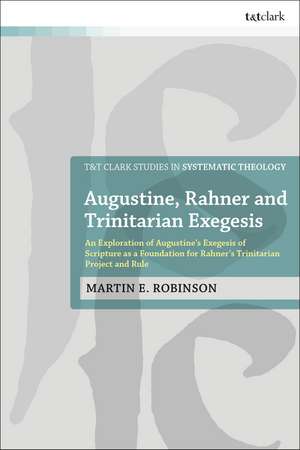Augustine, Rahner and Trinitarian Exegesis: An Exploration of Augustine's Exegesis of Scripture as a Foundation for Rahner's Trinitarian Project and Rule: T&T Clark Studies in Systematic Theology
Autor Rev Dr Martin E. Robinsonen Limba Engleză Hardback – 29 mai 2024
Din seria T&T Clark Studies in Systematic Theology
- 22%
 Preț: 225.67 lei
Preț: 225.67 lei -
 Preț: 495.47 lei
Preț: 495.47 lei - 22%
 Preț: 236.54 lei
Preț: 236.54 lei -
 Preț: 257.12 lei
Preț: 257.12 lei - 22%
 Preț: 597.37 lei
Preț: 597.37 lei - 13%
 Preț: 256.59 lei
Preț: 256.59 lei - 13%
 Preț: 257.97 lei
Preț: 257.97 lei - 21%
 Preț: 216.70 lei
Preț: 216.70 lei - 22%
 Preț: 257.97 lei
Preț: 257.97 lei - 31%
 Preț: 889.88 lei
Preț: 889.88 lei -
 Preț: 257.03 lei
Preț: 257.03 lei - 13%
 Preț: 258.96 lei
Preț: 258.96 lei - 13%
 Preț: 257.59 lei
Preț: 257.59 lei - 13%
 Preț: 238.22 lei
Preț: 238.22 lei -
 Preț: 256.59 lei
Preț: 256.59 lei - 21%
 Preț: 217.17 lei
Preț: 217.17 lei - 22%
 Preț: 260.16 lei
Preț: 260.16 lei -
 Preț: 256.20 lei
Preț: 256.20 lei -
 Preț: 257.50 lei
Preț: 257.50 lei - 13%
 Preț: 224.58 lei
Preț: 224.58 lei - 22%
 Preț: 890.28 lei
Preț: 890.28 lei - 13%
 Preț: 258.42 lei
Preț: 258.42 lei - 22%
 Preț: 256.77 lei
Preț: 256.77 lei - 13%
 Preț: 258.69 lei
Preț: 258.69 lei - 22%
 Preț: 891.92 lei
Preț: 891.92 lei - 22%
 Preț: 232.72 lei
Preț: 232.72 lei - 31%
 Preț: 890.28 lei
Preț: 890.28 lei - 22%
 Preț: 256.95 lei
Preț: 256.95 lei - 23%
 Preț: 223.20 lei
Preț: 223.20 lei - 22%
 Preț: 257.41 lei
Preț: 257.41 lei - 14%
 Preț: 947.94 lei
Preț: 947.94 lei - 22%
 Preț: 949.17 lei
Preț: 949.17 lei - 22%
 Preț: 256.95 lei
Preț: 256.95 lei - 30%
 Preț: 775.02 lei
Preț: 775.02 lei
Preț: 510.75 lei
Preț vechi: 731.41 lei
-30% Nou
Puncte Express: 766
Preț estimativ în valută:
97.74€ • 106.14$ • 82.10£
97.74€ • 106.14$ • 82.10£
Carte tipărită la comandă
Livrare economică 23 aprilie-07 mai
Preluare comenzi: 021 569.72.76
Specificații
ISBN-13: 9780567714831
ISBN-10: 0567714837
Pagini: 224
Dimensiuni: 156 x 234 mm
Greutate: 0.52 kg
Editura: Bloomsbury Publishing
Colecția T&T Clark
Seria T&T Clark Studies in Systematic Theology
Locul publicării:London, United Kingdom
ISBN-10: 0567714837
Pagini: 224
Dimensiuni: 156 x 234 mm
Greutate: 0.52 kg
Editura: Bloomsbury Publishing
Colecția T&T Clark
Seria T&T Clark Studies in Systematic Theology
Locul publicării:London, United Kingdom
Caracteristici
First consideration of how Augustine's attention "to the biblical statements concerning the economy of salvation" intersects with Rahner's assessment of the Augustinian-Western tradition
Notă biografică
Martin E. Robinson is Assistant Minister at Hope Anglican Church in Leppington, Australia.
Cuprins
AcknowledgementsAbbreviationsChapter 1IntroductionChapter 2Augustine and the Economy: Scripture, De Deo Uno and Trino, Christology, Creation, and PietyChapter 3Augustine and the Economy: The Old Testament, Soteriology, and the Missions and ProcessionsChapter 4The Father-Son Relationship: Rahner's Rule, Contemporary Objections, and Augustine's ExegesisChapter 5The Son-Spirit Relationship: Rahner's Rule, Contemporary Objections, and Augustine's ExegesisChapter 6ConclusionBibliographyIndex
Recenzii
Karl Rahner combined his inspiring theology of the Trinity with a determined critique of Augustine's conception and the Western tradition. Various researchers have pointed out in the past that Rahner's criticism is partly incorrect and that Rahner's conception itself raises difficult questions. Martin E. Robinson's book shows more thoroughly than any previous research that a close reading of Augustine, especially through his biblical exegesis, partly anticipated Rahner's ideas on the Trinity and partly helps to solve problems that Rahner did not solve. The book is written with great clarity and is strong in its argumentation. It is just as stimulating for Trinitarian theology as it is for research on Rahner and Augustine.
The renewal of trinitarian theology in the late twentieth century took place in a climate of Augustine-forgetfulness sometimes expressed as Augustine-antipathy. We have long needed a re-reading of that influential movement, but with a better understanding of Augustine's trinitarianism in play. Martin Robinson carries out this important task, and the result is illuminating, surprising, and significant for the ongoing work of trinitarian exegesis.
The renewal of trinitarian theology in the late twentieth century took place in a climate of Augustine-forgetfulness sometimes expressed as Augustine-antipathy. We have long needed a re-reading of that influential movement, but with a better understanding of Augustine's trinitarianism in play. Martin Robinson carries out this important task, and the result is illuminating, surprising, and significant for the ongoing work of trinitarian exegesis.
